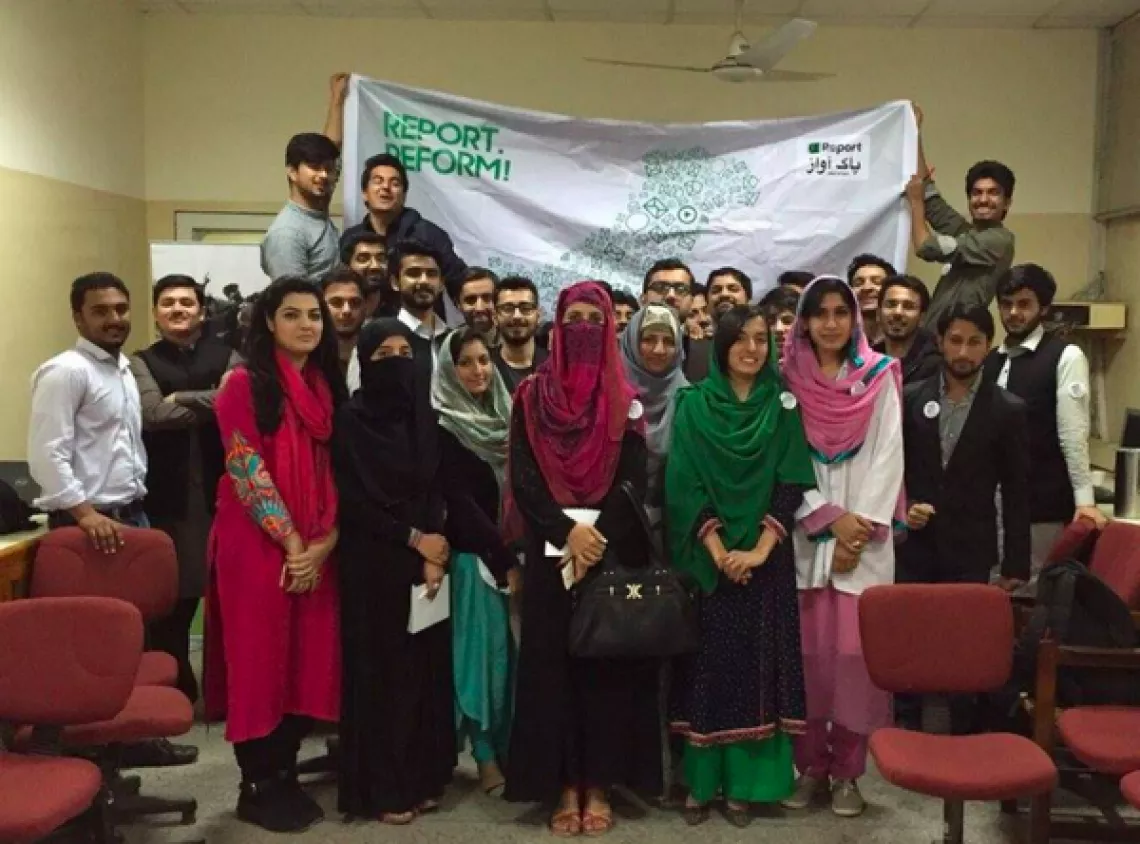Empowering Young Refugees Through SMS Technology
UNICEF and UNHCR sign partnership utilising U-Report PakAvaz


The partnership will utilise U-Report PakAvaz, UNICEF’s flagship innovative mobile-based social monitoring tool, to empower young people and community residents and strengthen community development and citizens’ engagements, through SMS Technology.
Pakistan continues to host approximately 1.3 million Afghan refugees, one of the largest protracted refugee situation in the world today. Currently, around two-thirds of the total population reside in (semi-) urban areas across the country, while the remaining one-third live in 54 refugee villages. Most of these refugees are second or third generation children and youth born in Pakistan. Figures show that 64% of the Afghan refugee population are under the age of 25 (with children under the age of 18 constituting over half of the population), and 25% are youth between the ages 18-24.

The growing ubiquity of mobile phones in the developing world is unlocking tremendous opportunities to amplify voices of young people; information and communication technologies. Mobile phones empower local communities to participate in policy-making, governance, and access to information on key social issues. This global initiative is called U-Report with more than 2.8 million active users in over 28 countries globally, including Pakistan.
As many refugee youths have cell phones and are connected to media, U-Report PakAvaz’s platform creates a space for young refugees to have a voice and develop leadership and empowerment opportunities for the refugee youth in their community.
“Through this collaboration, UNICEF Pakistan has high hopes in the potential of U-Report PakAvaz for young refugees in Pakistan. We are in a country with one of the largest population of young people. This collaboration with UNHCR will make visible the need and issues of young refugees in the areas of health, education, protection, water sanitation and hygiene and social welfare through the use of technology and mobile phones.”
“In the context of Pakistan 64% of young Afghan refugees are under the age of 25. In order to respond to rising needs communicating with this demographic is crucial. Empowered youth are agents of change and U-Report PakAvaz is an important platform to hear the voices of young refugees that will enable us to do our work better.”
Young people can report on the issues related to their communities through SMS, Twitter, and Facebook. Relevant reports will be sent to decision makers at different levels to advocate for improvements in services and highlight key issues to reduce the distance between citizens, refugees and decision makers. Furthermore, this will enable refugee youth to become active participants in their communities, communicating challenges and being part of solutions.

UNICEF and UNHCR will work with telecom providers, community partners, non-governmental organizations (NGOs) and youth-led networks to create a network of refugee U-Reporters in Pakistan. The platform relies on volunteer community members, mostly young people – primarily between the ages of 10-25 years serving as U-Reporters. Members join the programme by sending a free SMS “join” to a short-code 8623 or U-Report PakAvaz twitter handle @PakAvaz.
Weekly SMS messages and polls are sent out to the community of U-Reporters, who respond to the polls and exchange views on a wide range of subjects. The data is mapped and analysed in real-time, to each district and compiled on a national level giving government and development partners an insight into the needs of their citizens will be mapped. The results are then shared on a public website www.ureport.pk and are explored further with additional questions and responses continuing the dialogue.
The implementation of the U-Report PakAvaz platform is guided by the Convention on the Rights of the Child (CRC), and UNICEF internal guidelines.
About UNICEF
UNICEF promotes the rights and wellbeing of every child, in everything we do. Together with our partners, we work in 190 countries and territories to translate that commitment into practical action, focusing special effort on reaching the most vulnerable and excluded children, to the benefit of all children, everywhere.
For more information about UNICEF visit: www.unicef.org/pakistan and for U-Report PakAvaz, visit: www.ureport.pk
About UNHCR
UNHCR, the UN Refugee Agency, is a global organisation dedicated to saving lives, protecting rights and building a better future for refugees, forcibly displaced communities and stateless people. Our dedicated staff work in 128 countries around the world, from major capitals to remote and often dangerous locations.
For further information, please contact:
Daniel Timme, Chief – Advocacy and Communications – UNICEF Pakistan, dtimme@unicef.org, +92 51 2097700
Dan McNorton, Senior External Relations Officer – UNHCR Pakistan at mcnorton@unhcr.org, +92 51 2600860-5




